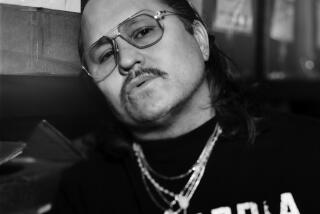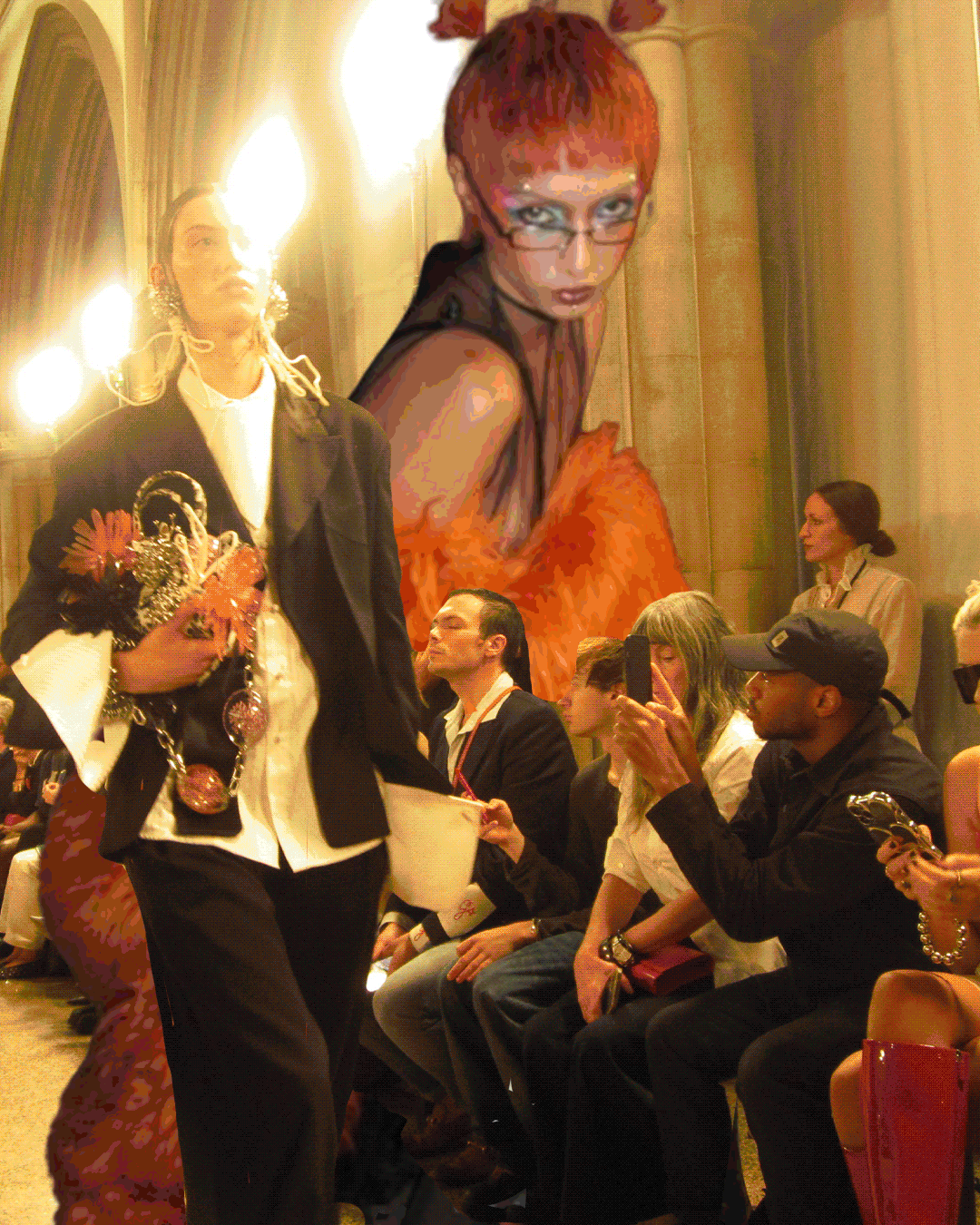Serving as a Model
- Share via
NEW YORK — It is a grim, rainy day at the Chelsea Piers, where the fashion staff of Allure magazine awaits the arrival of models for a 10-page photo shoot. Alek (pronounced uh-LEK) Wek blows into the dark studio like a crackling electrical storm. The 24-year-old model transcends the stereotype of her trade. Tall, yes. She is 5 feet 11. Beautiful, yes. But far from the average cover girl.
Dressed in a baseball shirt and a long skirt, the model is clearly at home in these surroundings. She slips a white lab coat over her clothes and briefly catches up with another model, Kiara, before plunking down in the makeup chair. It takes makeup artist Christian McCullough only a short time to apply Wek’s game face--moisturizer and neon slabs of blue swiped across her eyelids.
Born in southern Sudan and raised as part of the Dinka tribe, Wek conjures up visions of an ancient African goddess. Yet she is so streamlined and modern-looking that she could be cast in a movie as a woman of the future.
She appears to be carved from ebony. “She is,” McCullough said, “one of the blackest girls around.” Her body is powerful, graceful, statuesque and, against the trend, not surgically enhanced. Her hair, which she said is unruly this day, is just a bit longer than a crew cut. “I don’t look good in hair,” she said. With her round, baby face and her blazing white, slightly gap-toothed smile, she defies traditional standards of beauty.
Wek is considered to be among the top fashion models in the world, earning, according to several industry sources, millions of dollars a year. In 2000 she was named Model of the Decade by the trend-setting i-D magazine; she was MTV Model of the Year in 1997, and one of People magazine’s “50 Most Beautiful People” in 1999. But ask her to define herself, and “model” might not be the first word Wek would use. Daughter, sister, refugee, painter, social activist and designer seem closer to her core than modeling. And though the glitzy job more than pays for the pristine, three-story Brooklyn brownstone where she has lived for two years with Cocoa, a pit bull, and her cats, Onyx and Seema, there is not an obvious shred of evidence of a model’s lair here. Not an award, magazine cover or photo spread in sight. The white plaster walls are covered, instead, with huge canvases painted by Wek. In her upstairs office, one side of the room is a montage of sketches, bits of materials and drawings of pocketbooks that reflect her latest project, a handbag line.
Dressed in a thin, dark shirt, Diesel jeans and a chunky turquoise-studded belt, Wek sinks into a cushy dark suede couch (a gift from Coach, the leather company that included her in its Most Influential People campaign). She transports herself back to childhood in Sudan where her earliest memories are happy. Her world collapsed when the civil war broke out in 1982. Soldiers fired guns randomly into her house, schools were closed, electricity turned off. On more than one occasion, her parents gathered their nine children (Wek is the seventh) to move to another temporary location, literally running for their lives. “We would just take a necessity--a bowl, some food, a little bit of clothing. I can remember walking miles and crossing the river on foot and walking through the bush,” she said.
The death of her father because of poor medical care in the war-torn country was a pivotal point in Wek’s life. “We couldn’t be there without him,” she said. At 14, she fled. A family friend helped get Wek and her younger sister on a plane to London, where she went to stay with an older sister who had established residence several years before.
“I was terrified and didn’t speak a word of English.” Wek worked odd jobs, everything from cleaning to supermarket cashiering to assisting in a hair salon.
By 18, Wek found her avocation while attending the London Institute, where she studied painting and design. “I loved to paint, and that’s what satisfied my soul,” she said. “It was like everything is OK. I feel right.” A British modeling agency representative discovered Wek at 19 in a London market. “She asked me if I would like to be a model. I thought she was joking or making fun of me, the way people are always asking me why I don’t play basketball. I thought this cannot be for real, but it was.”
Her rise to superstardom was meteoric. “She’s a supermodel, although I hate that term,” said Maja Edmonston, creative director of IMG who represents Wek. “She is beyond one of our top 10 models. Her personality makes her more interesting than anyone else. She defies the law of modeling, and though she’s not conventional, she is great. She’s a top earner who works as much as she wants to.” Edmonston also represents Tyra Banks, Gisele Bundchen and Heidi Klum. Allure magazine’s creative director, Paul Cavaco, concurs. “There is always an unusual one in fashion. The one that makes a great picture. And here she is with that shaved head, skinny body and big booty. When you see that girl smile and look at the photo, it transcends the page.”
He compares Wek to her physical opposite. “They said about Marilyn [Monroe] that you could feel her flesh on the page. That’s the quality Alek has.”
Donna Karan regularly features Wek in her shows because, said spokeswoman Patty Cohen, “Donna designs for the universality of women and Alek illustrates that. She’s not just a pretty face, but she’s very modern, and everything she wears becomes very memorable.”
Despite the fanfare, Wek has chosen not to forget the past. She serves on the advisory board for the U.S. Committee for Refugees. She speaks in New York-area schools to bring attention to the famine in southern Sudan.
In June 1998, Wek returned to Sudan under the USCR’s auspices. “She’s been extremely helpful,” said Caroline Brennan, a senior development associate for the organization. “Her experience as a Sudanese refugee adds a unique perspective. She has definitely had an impact and been able to put a face on the plight of Sudanese refugees.”
“One of the things this job gave me is the voice to be able to give back,” Wek said. “Not everybody is lucky enough to do this. It’s like there’s a fire burning in Sudan, and no one’s putting it out. Innocent people are the ones suffering, and a lot of the world doesn’t know it’s happening. If I didn’t do this, I would feel really, really selfish inside. To be able to possibly give another human being an opportunity, that’s priceless.”
Aside from this, for the past year, Wek has been working on a line of handbags and belts that will debut next fall--a result of personal need. “In this business, you travel so, so much and nothing was working that well for me,” she said. “The bags were falling off my shoulder, and I didn’t want to have to be looking around inside to find what I needed. I wanted them to be great-looking and efficient. It also came out of my painting. For years, I would see a shape I liked and paint it in my idea book. It’s something that lets me be really creative, and it’s fun.”
The line, Wek1933, is named to honor her father (it’s the year of his birth). An ambitious selection of 23 styles includes minaudieres, lined with silk-screened patterns based on the lifelines of her palms. One larger style is inspired by her father’s briefcase, while a group of woven leather shoppers with calfskin trim is based on bags her mother used to carry in Sudan.
Though the glam life has its appeal for the young woman, traditional values still seem to guide her. She likes to party but after 10 p.m. finds herself tuckered out and needing shut-eye. She eschews the latest “place-to-be-seen” restaurants, preferring local joints that serve spicy Dominican or Indian food. When she moved into her brownstone, she couldn’t get comfortable until her mother, Akuol, came to bless the space. “She walked through it all with a gourd from Sudan, something she made, and sprinkled water, giving each room a blessing. There were many other spirits here,” Wek said.
As for a social life, Wek admits to having her first boyfriend. “Of course, I’ve dated, but this is my first real steady relationship,” she said. A fabulous jet-setter beautiful person? “Oh, no,” she said, laughing. “He’s a building contractor from the neighborhood named Debo.”
The future looks bright for the young woman. “I think the sky’s the limit for Alek,” said her agent, Edmonston. “Whether she goes into acting, becomes a successful designer or stays modeling, she’ll be working until she’s old and gray.”
Wek’s take on it is simpler. “One of these days I will have a family, but give me five or six years. For now, I am lucky to have a career, I love my painting and I’m happy. And success to me is to be happy.”






